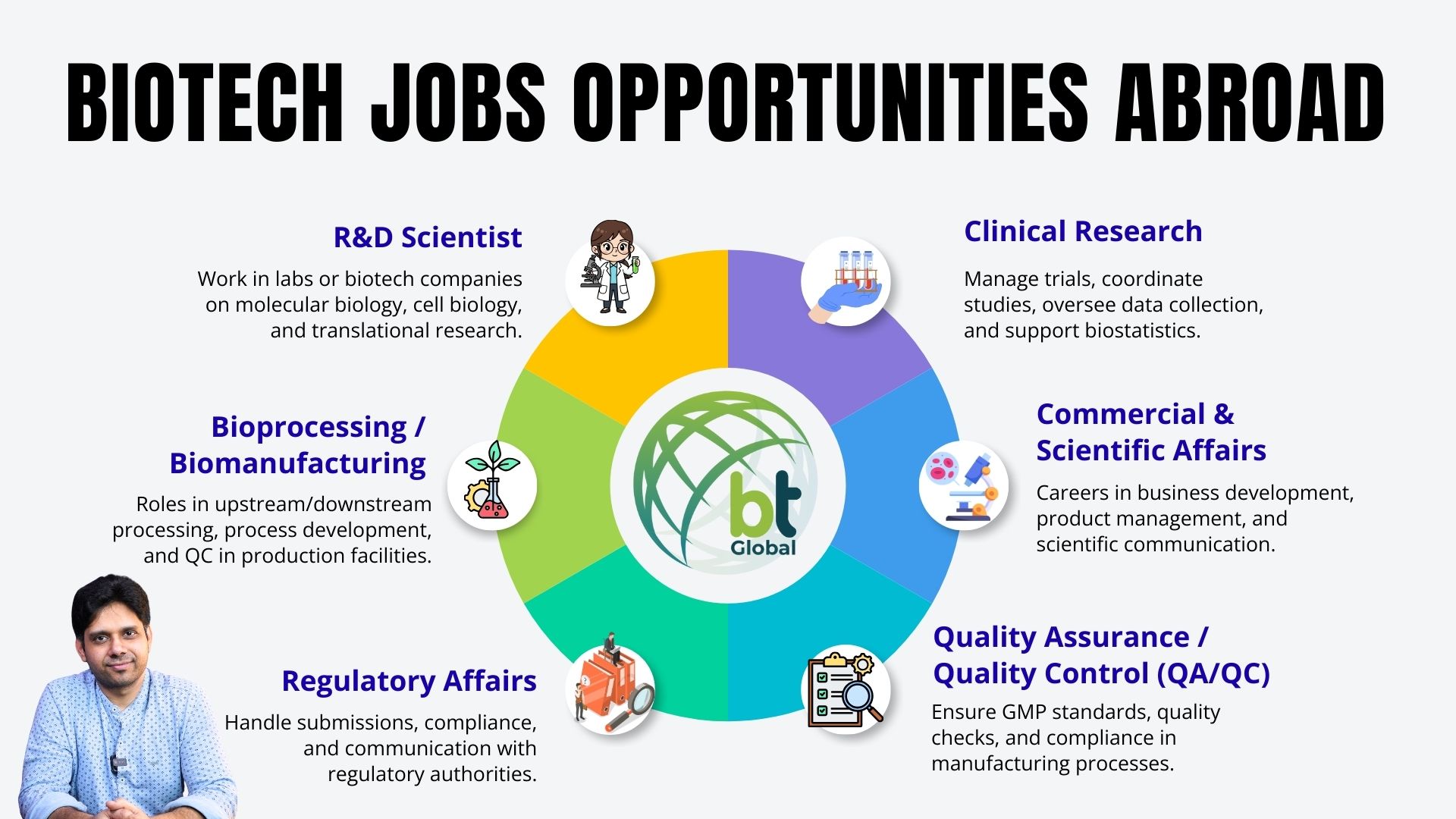How to Move Abroad as a Biotech or Life Science Professional
Hey There! Did you know that the global biotech workforce is estimated to grow by over 20% in the next five years? And the biotech hubs across the world are accelerating this growth by actively recruiting young minds across the globe. From clinical research in Singapore to biomanufacturing in Germany and regulatory affairs in the UK, the biotech jobs abroad are endless for skilled life science professionals.
For students and early-career scientists, moving abroad is not just about getting a higher salary package. It’s about gaining global exposure, access to advanced technology, and building strong international connections that span continents. Yet, this journey to an international career is not easy. You must know where the real demand is, what qualifications you need, and which visa opens the door for your dream job.
So, are you ready to turn your ambition into an inspiring career that spans continents? Here is an article that will show you practical pathways, opportunities, and strategies to secure biotech jobs abroad and succeed in this international biotech race.
Understanding the Global Biotech Market
Key Markets & Why They Matter
We need to understand that the demand for skilled life science professionals is not uniform across the globe. There are some countries and regions that stand out as biotech innovation hubs and attract international talent. To ease your work, here is a table that highlights the countries and biotech hubs:
| Country | Biotech Strengths | Key Cities / Hubs | Opportunities for International Applicants |
| USA | R&D, Biomanufacturing, Gene Editing | Boston, San Francisco, Research Triangle | High demand in R&D, regulatory affairs, and clinical research |
| UK | Academic research, Biopharma, Startups | London, Cambridge | Global Talent visa, Skilled Worker visa, and strong academic networks |
| Germany | Biomanufacturing, Diagnostics | Berlin, Munich, Frankfurt | EU Blue Card, high biomanufacturing demand |
| Canada | Research, Pharma, Biomanufacturing | Toronto, Vancouver, Montreal | Express Entry, Innovation streams |
| Australia / New Zealand | Biotechnology research, Biopharma startups | Sydney, Melbourne, Auckland | Skilled migration visas, research programs |
Demand Trends & Emerging Fields
Now that you have understood the biotech hubs, here is the list of some of the fastest-growing and high-demand life sciences roles in top biotech markets:
- Gene Editing & Genomics: With the years of hard work, today we have technologies such as CRISPR. These latest tools are improving the therapy development.
- Biomanufacturing: The biotech industry is scaling up the biologics and cell & gene therapies. This has created a high demand for manufacturing experts (process engineers, QA/QC).
- Regulatory Affairs: As biotech products become more complex, the industry needs regulatory specialists who understand global standards (e.g., ICH, EMA, FDA).
- Clinical Research & Biostatistics: After the pandemic, the world is more focused on Clinical trial operations, data management, and statistical analysis.
- Data & Bioinformatics: The rising data-driven biology has led to a high demand for skilled professionals in bioinformatics, data science, and AI‑driven biology.
Biotech Jobs Abroad: Opportunities and Challenges
Types of Roles You Might Find
If you have ever searched for biotech jobs for international applicants, then you must have come across these roles for sure:
- R&D Scientist: These professionals work in academic labs, biotech startups, or pharma, focusing on molecular biology, cell biology, or translational research.
- Bioprocessing / Biomanufacturing: If you are interested in the production of biological products, then you must have heard about roles like process development scientist, downstream/upstream engineer, or quality control technician.
- Regulatory Affairs Specialist: If you want to build a career in regulatory affairs, then you will be working on regulatory submissions, working with authorities, and ensuring compliance.
- Clinical Research Professional: As a clinical research expert, you will have to manage or coordinate clinical trials, doing data management or biostatistics.
- Commercial & Scientific Affairs: In this job, you will be working in business development, scientific communications, or product management roles.
- Quality Assurance / Quality Control (QA/QC): The evergreen job of QA/QC allows you to ensure manufacturing practices meet GMP standards.
Challenges to Be Aware Of For a Biotech Jobs Abroad
Moving to another country may look fancy, but it is not easy, especially in biotech. Some of the most common challenges are:
- Visa Sponsorship: Many biotech roles require employer sponsorship, which can be a barrier or limit your options.
- Qualification Recognition: Your educational credentials (e.g., MSc, PhD) and experience may or may not directly meet the international expectations.
- Cultural & Language Differences: Even in English-speaking regions, you may find that the working style, lab norms, and workplace culture may differ significantly.
- Networking: While you are establishing a professional network in a new country, it’s important to understand the importance of local contacts.
- Regulatory Complexity: You should know that the Biotech industry is different in each country. Every nation follows different regulatory regimes, and specialists are required to navigate these.
- Relocation Costs: moving abroad is beyond the visa; there are costs for moving, housing, insurance, and settling in.
Key Qualifications & Skills for Success
In the race for life science jobs abroad, you need to stand ahead of the rest, and this can be possible with your qualifications and skill sets.
Educational Background
- Advanced Degrees:
- A master’s or doctoral degree often helps in landing an R&D job.
- If you want to get into manufacturing-related roles, then a bachelor’s degree in biochemical engineering or a related field may suffice; these degrees will give you an edge.
- Specialized Certifications: Get yourself certified in regulatory affairs, GMP (Good Manufacturing Practice), or quality systems. It can boost your profile on an international platform.
- Continuous Learning: Today, there are many Online courses, micro‑credentials, and professional development opportunities (e.g., in bioprocessing and bioinformatics), particularly for emerging roles.
Essential Skills
- Scientific Knowledge: You must have a deep understanding of molecular biology, genetics, cell culture, and biochemistry.
- Regulatory Literacy: Get yourself Familiar with regulatory frameworks like ICH, FDA, EMA, and clinical trial processes.
- Process Engineering: For manufacturing roles, you have to scale up your skills; optimization and quality monitoring are crucial.
- Data Skills: Learn the latest tools, like Bioinformatics, data analytics, and computational biology, which are increasingly required.
- Project Management: Ability to lead research or development projects, coordinate teams, and hit milestones.
- Soft Skills: You need Strong communication, adaptability, problem-solving, and cross-cultural competence to go a long way.
Visa Requirements for Biotech Jobs Abroad
One of the biggest challenges that every life science professional moving abroad faces is navigating the visa requirements for biotech jobs. To help overcome this challenge, we have given some common immigration paths used by life science professionals:
Popular Visa Pathways
| Country | Visa Type | Target Audience | Key Requirements |
| UK | Global Talent Visa | Researchers, Academics, Innovators | Endorsement from Royal Society/UKRI, Proof of achievements |
| UK | Skilled Worker Visa | Professionals with sponsorship | Job offer, salary threshold, degree-level role |
| USA | O‑1 Visa | Scientists with extraordinary ability | Evidence of international recognition, achievements |
| USA | H‑1B Visa | Specialty occupations | Job offer, degree requirement, lottery selection |
| Canada | Express Entry / Innovation Stream | Skilled Workers | Job offer / Points system, educational credential recognition |
| Germany | EU Blue Card | Skilled Workers | Degree-level role, salary threshold, work contract |
What Immigration Officials Look For
A visa is the key to your dream life science career. While applying for a visa, here are some things that you should be mindful of:
- Job Offer & Sponsorship: Many work visas require an employer to sponsor your application, so make sure you get it.
- Evidence of Skills / Achievements: Your academic publications, patents, awards, or letters of recommendation can strengthen your application.
- Minimum Salary or Funding: Some visas require proof that you will be paid a certain threshold or can support yourself.
- Endorsement or Accreditation: If you are applying for visas such as UK Global Talent, then you need endorsement from peer bodies.
- Healthcare or Insurance: The United Kingdom charges an Immigration Health Surcharge for certain visa types.
- Background Checks & Biometrics: Your Security checks, identity verification, and medical checks are routine; you must follow.
- Language Proficiency: While some countries ask for English or local language proficiency, not all do.
Pathways to Secure Biotech Jobs Abroad
If you want a biotech job abroad, then you must understand that it is more than just applying for the jobs online. You need a strategy, and here is one for you:
Job Search Strategies
- Specialized Job Boards: You can use biotech or life sciences-specific job platforms like Biotechnika Global, academic job portals, and CRO company websites for searching job opportunities.
- Company Research: You should target multinational biotech firms or pharma companies with global operations. They may transfer or hire you internationally.
- Employer of Record (EOR): For contract or remote roles, you can work for a company in another country via an EOR, which handles compliance and payroll.
Networking & Professional Development
- Professional Societies: The best way to build a strong network is by joining organizations like the International Society for Pharmaceutical Engineering (ISPE), regulatory societies, or research groups.
- Conferences & Workshops: You can attend global biotech conferences to present your work, meet hiring managers, and learn current trends.
- Collaborative Research: To stand out from the rest, you can participate in cross-country research projects or co-author international publications. This will help you gain global experience.
- LinkedIn & Social Media: While the world is digitalizing, you can build your LinkedIn profile that highlights your international ambitions, showcase your research, and connect with recruiters or hiring managers.
Preparing Your Application
- CV/Resume: Tailor your resume for international biotech roles. Your resume must focus on global experience, publications, and regulatory or process expertise.
- Relocation Planning: Be ready to discuss your relocation logistics (costs, timing) with employers.
- Portfolio / Publications: Showcase your research, patents, or industrial projects; this is especially helpful when applying for R&D roles.
- Financial Planning: Plan your finances. Don’t just budget your visa costs but also travel, accommodation, and daily expenses in a new country.
Overcoming Challenges & Making the Most of the Move for Biotech Jobs Abroad
You know relocating abroad as a biotech professional comes with both risk and reward. Here are some ways you can navigate potential pitfalls and maximize your impact:
- Mentorship: You should seek mentors who have themselves moved internationally. They can guide you on cultural adjustment, career planning, and navigating local scientific ecosystems.
- Cultural Preparedness: Take language, communication, and cultural training. Understanding local work norms and expectations helps you integrate faster.
- Flexible Mindset: Be open to roles that may not be your “dream job” but provide a foot in the door, especially early in your international career.
- Stay Informed: Monitor immigration policy changes, biotech funding trends, and hiring patterns. Being proactive helps you make strategic decisions.
- Mental & Social Well-being: When you decide to move to a new country, it becomes emotionally challenging. Build a support network (both personal and professional) as early as possible.
Conclusion
If you are a life science student, researcher, or early-career professional with dreams of biotech jobs abroad, pursuing an international career is very feasible and potentially transformative.
The global biotech industry offers you an extraordinary opportunity that includes global exposure, cutting-edge research, and stronger career trajectories. But this journey is not easy. There are multiple steps, such as visa approval, skill alignment, and relocation logistics, and more.
To succeed:
- You should do a deep research on promising global biotech markets, such as the U.S., UK, Germany, and emerging hubs.
- While you are researching, develop strong academic credentials, regulatory expertise, and cross-functional skills along the way.
- Understand and plan for visa requirements relevant to your target country.
- Use targeted job search strategies, build networks, and showcase your international mindset.
- You have prepared yourself for both the professional and personal challenges of relocation.
With careful preparation and a growth mindset, you can make your move abroad a springboard for lasting success. The field of life sciences is global by nature, and your career can be, too.







